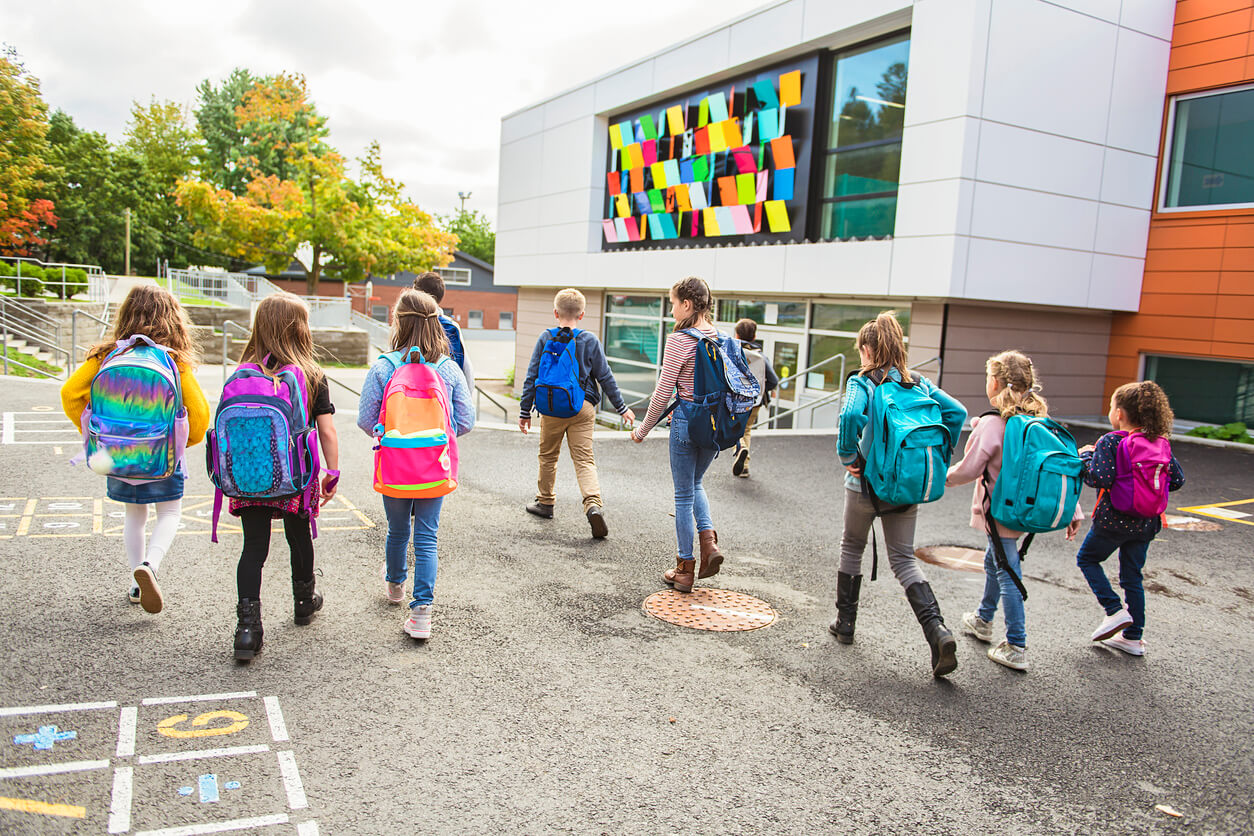The 5 Benefits of Walking for Children

The benefits of walking for children are numerous, which is why walking stands out as one of the most recommended physical activities worldwide. In addition to the above, it’s considered to be the starting point to combat sedentary lifestyles, one of the main evils of our time.
Although children are characterized by being restless or constantly moving, this is no longer a universal norm. One of the causes of such a tendency toward stillness is the overuse of electronic devices, which have become the main entertainment in many homes.
Beyond looking for the reasons for sedentary lifestyles, the goal of change should focus on encouraging movement. And in this sense, knowing the virtues of walking for children will help you develop the best plan of action. Don’t miss this article!
The benefits of walking for children
Walking isn’t only a healthy habit, but can also be an entertaining activity for children and adults. During a walk, you can carry out different playful proposals and have an enjoyable time with the whole family.
Therefore, walking offers a number of benefits for physical and psychological health at any age. We invite you to know what these positive aspects are and how your little one can obtain them.
1. Counteracts sedentary lifestyles
One of the main benefits of walking, both in children and adults, is based on counteracting sedentary lifestyles.
As mentioned above, the tendency to remain still is one of the most common problems in the world. Nowadays, children remain seated or lying down for long hours, either at school or at home.
Therefore, activities led by walking can be the starting point to get them to acquire a healthy habit in their daily routines. At the same time, it can also be the bridge to other types of beneficial activities, such as sports.

2. Walking promotes learning
Learning is one of the most important aspects of a child’s life, as the school day represents a large percentage of their time and effort. However, sometimes, lack of concentration and motivation can interrupt the acquisition of new concepts.
However, the increase of physical activity in the daily routine of children favors concentration, stimulates the imagination, and increases motivation. This is because exercise increases the amount of oxygenated blood that reaches the brain, as well as other crucial areas of the body.
Therefore, walking to school is much more than a form of transportation.
3. Contributes to the health of the cardiovascular system
When referring to blood irrigation, we also have to talk about the cardiovascular system.
Among the most well-known benefits of walking is the improvement of cardiac, pulmonary, and circulatory health.
In order for children to obtain these physical benefits, it’s a good idea to implement daily walks that last at least 30 minutes per day and even with variations in intensity. As the intensity increases, the cardiovascular stimulus tends to increase as well.
4. It favors the development of physical capacities
Walking is one of the best alternatives to getting in shape, and children are no exception.
If children do this activity regularly, it also enhances the development of various physical and motor capacities, among which endurance and strength stand out. In addition to these, it’s possible to improve agility and flexibility, but these skills require combined work between walking and other exercises.

5. Walking improves mood
Mood is another important factor in children’s lives, which influences most of their daily tasks. For this reason, it’s necessary to keep the mood at positive levels as long as possible.
An alternative to improve emotions is to go for a walk, especially those that are carried out in groups and outdoors. Take advantage of leisure time to implement tours in ecological trails, parks, or zoos. This way, walking will be much more entertaining and relaxing.
Benefits of walking for children as a family
The benefits of walking for children can be obtained alone or together. But without a doubt, walking as a family is much more comforting. It will also allow children to gain more confidence in themselves and their abilities, and will even allow them to strengthen their interpersonal bonds.
What are you waiting for to go for a walk?
The benefits of walking for children are numerous, which is why walking stands out as one of the most recommended physical activities worldwide. In addition to the above, it’s considered to be the starting point to combat sedentary lifestyles, one of the main evils of our time.
Although children are characterized by being restless or constantly moving, this is no longer a universal norm. One of the causes of such a tendency toward stillness is the overuse of electronic devices, which have become the main entertainment in many homes.
Beyond looking for the reasons for sedentary lifestyles, the goal of change should focus on encouraging movement. And in this sense, knowing the virtues of walking for children will help you develop the best plan of action. Don’t miss this article!
The benefits of walking for children
Walking isn’t only a healthy habit, but can also be an entertaining activity for children and adults. During a walk, you can carry out different playful proposals and have an enjoyable time with the whole family.
Therefore, walking offers a number of benefits for physical and psychological health at any age. We invite you to know what these positive aspects are and how your little one can obtain them.
1. Counteracts sedentary lifestyles
One of the main benefits of walking, both in children and adults, is based on counteracting sedentary lifestyles.
As mentioned above, the tendency to remain still is one of the most common problems in the world. Nowadays, children remain seated or lying down for long hours, either at school or at home.
Therefore, activities led by walking can be the starting point to get them to acquire a healthy habit in their daily routines. At the same time, it can also be the bridge to other types of beneficial activities, such as sports.

2. Walking promotes learning
Learning is one of the most important aspects of a child’s life, as the school day represents a large percentage of their time and effort. However, sometimes, lack of concentration and motivation can interrupt the acquisition of new concepts.
However, the increase of physical activity in the daily routine of children favors concentration, stimulates the imagination, and increases motivation. This is because exercise increases the amount of oxygenated blood that reaches the brain, as well as other crucial areas of the body.
Therefore, walking to school is much more than a form of transportation.
3. Contributes to the health of the cardiovascular system
When referring to blood irrigation, we also have to talk about the cardiovascular system.
Among the most well-known benefits of walking is the improvement of cardiac, pulmonary, and circulatory health.
In order for children to obtain these physical benefits, it’s a good idea to implement daily walks that last at least 30 minutes per day and even with variations in intensity. As the intensity increases, the cardiovascular stimulus tends to increase as well.
4. It favors the development of physical capacities
Walking is one of the best alternatives to getting in shape, and children are no exception.
If children do this activity regularly, it also enhances the development of various physical and motor capacities, among which endurance and strength stand out. In addition to these, it’s possible to improve agility and flexibility, but these skills require combined work between walking and other exercises.

5. Walking improves mood
Mood is another important factor in children’s lives, which influences most of their daily tasks. For this reason, it’s necessary to keep the mood at positive levels as long as possible.
An alternative to improve emotions is to go for a walk, especially those that are carried out in groups and outdoors. Take advantage of leisure time to implement tours in ecological trails, parks, or zoos. This way, walking will be much more entertaining and relaxing.
Benefits of walking for children as a family
The benefits of walking for children can be obtained alone or together. But without a doubt, walking as a family is much more comforting. It will also allow children to gain more confidence in themselves and their abilities, and will even allow them to strengthen their interpersonal bonds.
What are you waiting for to go for a walk?
All cited sources were thoroughly reviewed by our team to ensure their quality, reliability, currency, and validity. The bibliography of this article was considered reliable and of academic or scientific accuracy.
- Blanco, M. Et al. (2019) Ambiente familiar, actividad física y sedentarismo en preadolescentes con obesidad infantil: estudio ANOBAS de casos-controles. Atención primaria. https://www.ncbi.nlm.nih.gov/pmc/articles/PMC7118555/
- Camargo, D. & Ortíz, C. (2010). Actividad física en niños y adolescentes:
Determinantes y medición. Revista de la Universidad Industrial de Santander. Salud. http://www.scielo.org.co/scielo.php?script=sci_arttext&pid=S0121-08072010000200009
This text is provided for informational purposes only and does not replace consultation with a professional. If in doubt, consult your specialist.








